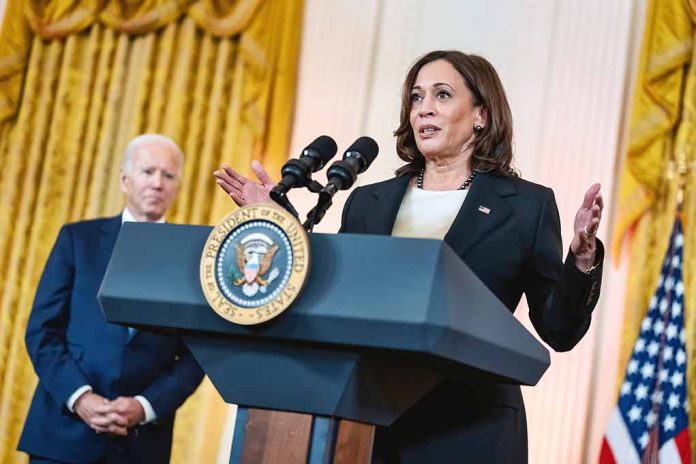
Volunteers seeking detailed policy information from Kamala Harris’s campaign faced significant resistance, causing frustration among supporters.
At a Glance
- Kamala Harris accepted the Democratic nomination for US president.
- Harris’s address received strong acclaim in Chicago, marking a successful week for Democrats.
- Despite positive trends, Harris has a fragile lead in opinion polls.
- The campaign is light on specific policy details, frustrating volunteers.
Harris Campaign Blocks Policy Details
Kamala Harris’s presidential campaign has faced criticism from volunteers who struggled to gain access to detailed policy information. This lack of transparency has frustrated supporters who are eager to effectively promote Harris’s platform to potential voters. Clear communication and detailed policy outlines are critical in political campaigns, particularly for grassroots efforts aiming to disseminate coherent messages to the electorate.
The Harris-Walz campaign, celebrating a highly enthusiastic week, organized over 200,000 new volunteer shifts since the Democratic National Convention began. The campaign also raised more than $540 million in just over a month. Kamala Harris, alongside her running mate Minnesota Governor Tim Walz, plans to capitalize on this momentum with a bus tour starting in South Georgia on Wednesday.
Volunteers’ Frustrations Amidst Enthusiasm
Despite the significant surge in volunteer sign-ups, the campaign’s higher-ups’ resistance to releasing detailed policy information has become a point of contention. Harris’s campaign has focused on delivering broad themes without diving into specifics, frustrating volunteers who wish to provide comprehensive answers to potential voters. Without clear policy details, it becomes challenging for these supporters to effectively promote the candidate’s platform.
Lloyd Doggett of Texas, the first Democratic lawmaker to call for Biden to withdraw, stated, “I think we were on a path to lose this election, and now we have a fighting chance to win it.”
Harris’s campaign has shifted to more moderate policies, dropping opposition to fracking and support for Medicare for All. Despite these adaptations, the campaign remains light on detailed plans for key issues. This strategic choice could be driven by a desire to appeal to a broader electorate, but it also risks alienating grassroots supporters who expect detailed commitments from their candidate.
Historical Significance and Current Challenges
Harris is seen as a historic figure and a symbol of hope for many. Predictions suggest she could defeat Donald Trump. However, she faces a tough crowd and a fragile lead in opinion polls. Many voters have already made up their minds, and the election remains too close to call. The upcoming debate with Trump on September 10 will be crucial for Harris to solidify her stance and gain further support.
“This whole, short-lived Harris honeymoon is over,” said Sen. Steve Daines of Montana, the chairman of the National Republican Senatorial Committee.
The Harris-Walz campaign will continue to rely on the enthusiasm of its volunteer base, despite the frustrations over policy details. Volunteers and supporters play a crucial role in maintaining momentum and energizing the broader electorate as the campaign advances toward the general election.







